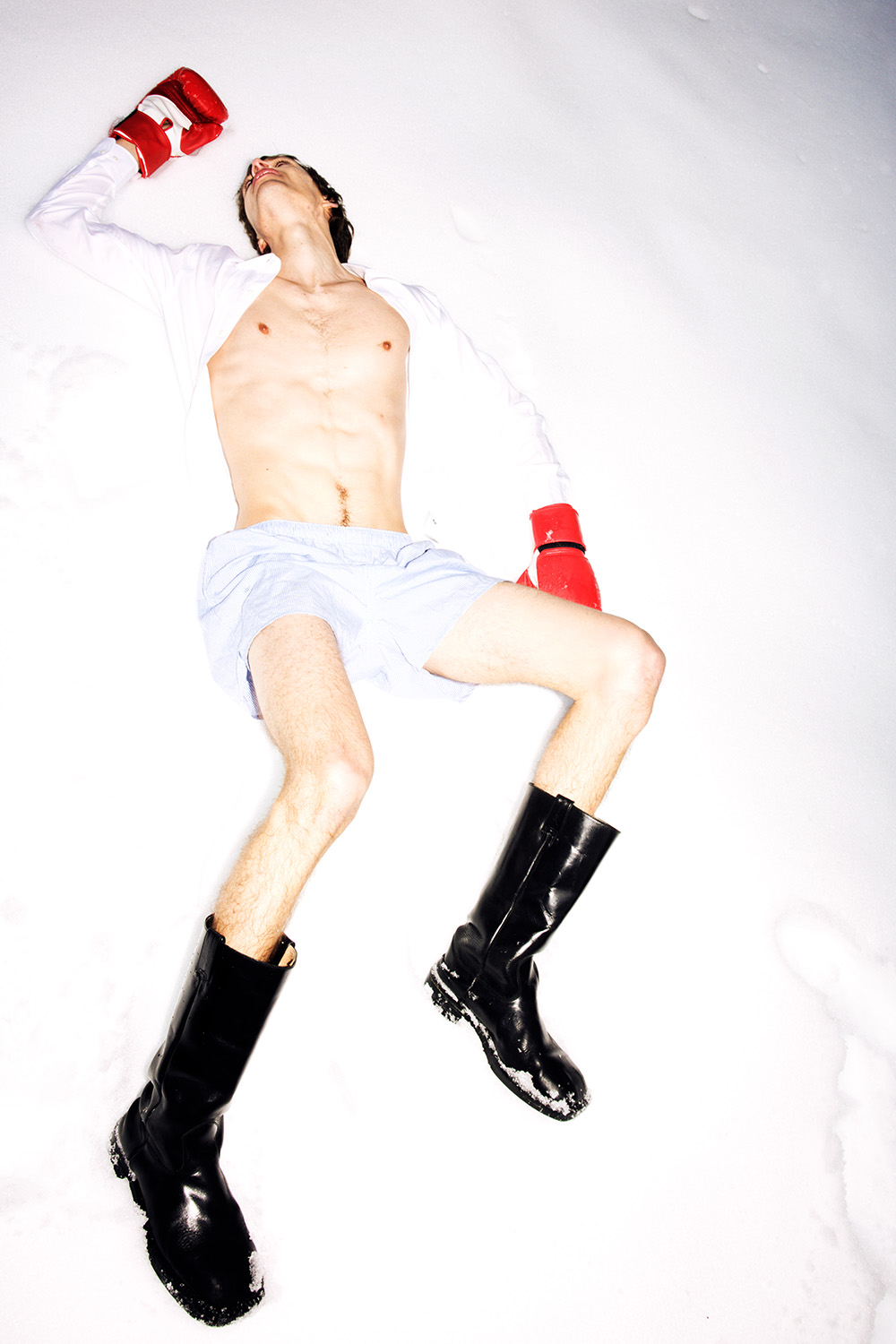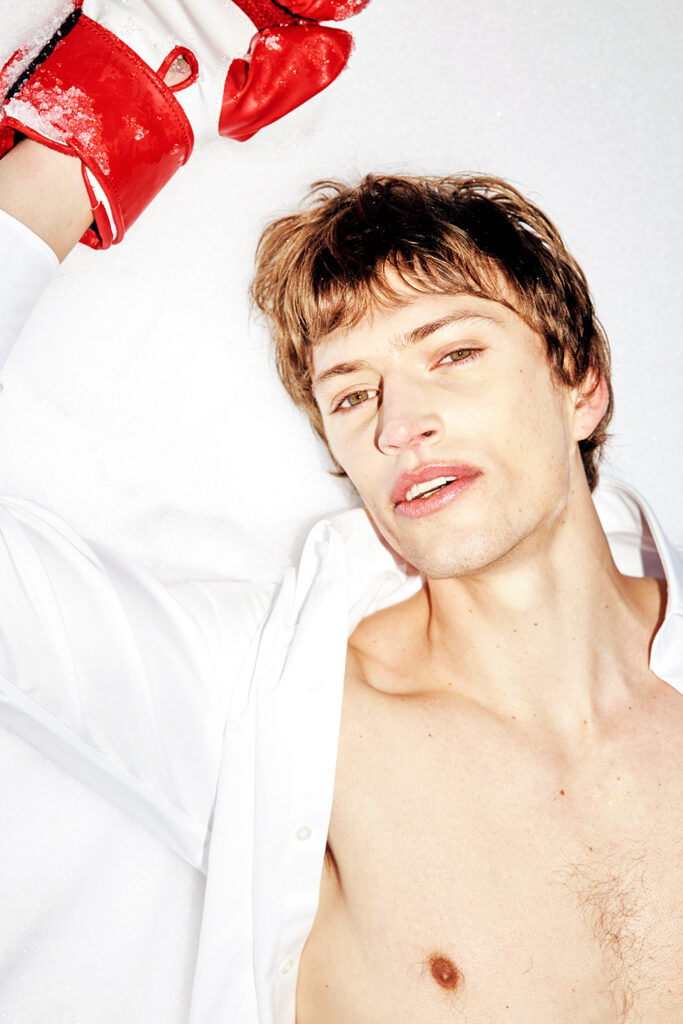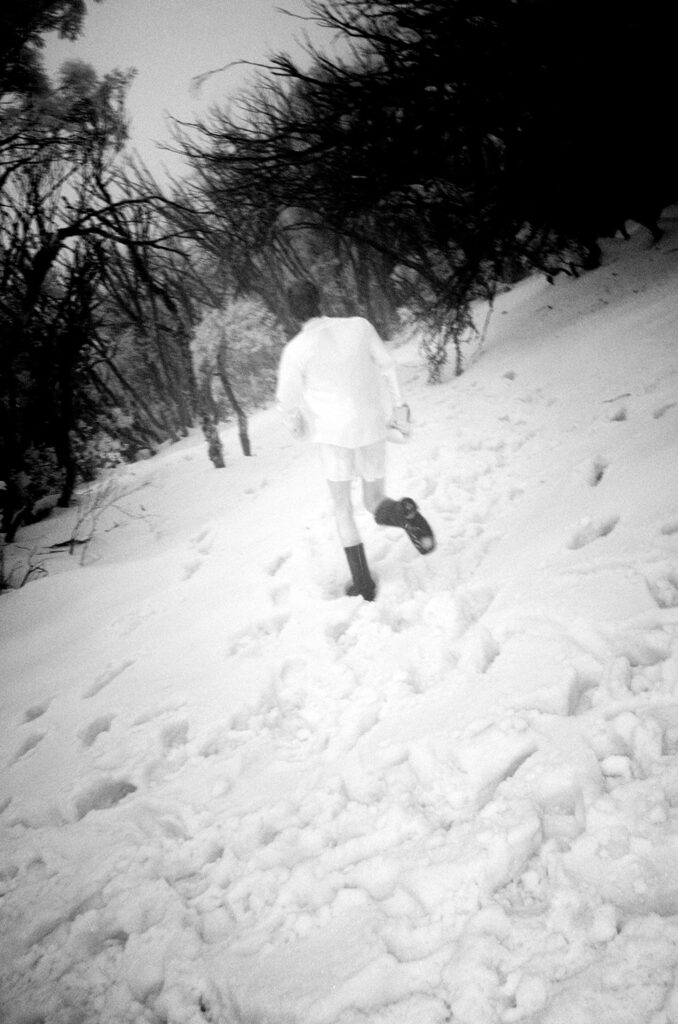Nuum: 'Heart Tape', a French Monastery, Tokyo and Pop Music

After releasing his mixtape ‘Heart Tape’, Sarah Buckley sat down with Solomon Gutteridge, also known as Nuum, to discuss what makes a strong pop song, his bizarre move to Tokyo and remarkable teenage years spent in a French monastery.
Sarah Buckley: Something I wanted to ask you, why the name Nuum?
Nuum: I made it up when I was seventeen, living in a monastery in France.
SB: I love how you just said that – ’I was just living in a monastery in France’.
N: Well, I guess it’s part of my story, right?
SB: Yeah.
N: I chopped it off the end of the word ‘continuum’. I’m not sure if I got the definition right but I sort of interpreted it as ‘continuous’.
SB: A continuum?
N: Yeah, I had all these cringy, wannabe sort of names and I thought, well, there’s actually a story to it – I was in a spiritual sort of monastery, and I was walking in the forest and my grandma just passed away. I was eating an apple at the time but as I was walking, I’d forgotten I’d eaten it, so I went to reach for it again and then I was like, Oh, I’ve already eaten it [laughs]. It’s super far-fetched [laughs] …
SB: I’m on the edge of my seat.
N: Obviously, I was on one, but I saw the apple as this sort of strong line between something being there and not being there, but then also being food in my stomach and that energy eventually going back to the earth [laughs].
SB: So, like, excreting?
N: Yeah. Things just go around and around. It’s not really a sound realisation at all, but I felt at peace with my grandma and the name. In Latin nuum means news, which I looked up on Google.
SB: Google Translate?
N: Yeah [laughs].
SB: Is it a persona for you now? Or an aesthetic choice?
N: I don’t think it’s a persona, it’s something I’ve grown up with and got used to.
SB: Do people call you Nuum when you see them?
N: Well, yeah, when I moved to Melbourne, I moved here for music and I had all my friends online who liked music, so when I saw people in person for the first time, they’d just call me Nuum.I think I’m used to it now.
SB: You weren’t before?
N: I grew up in a small town where I was the only one who really liked music and if anybody sort of talked about my music they’d use my artist name in that sort of derogatory way, to almost poke at it.
SB: It's almost the opposite here; I find you introduce yourself but you also have to follow-up with your social media username, you know?
N: Yeah, I’ll be at a house party and introduce myself with my name to someone let’s say, I follow, and I’ll have to say my username and then they’re like …
N + SB: Ahhhhhhhh, yes [laughs].

SB: Can we go back a bit? You said you grew up in a small town.
N: I grew up three hours south of Perth in Western Australia in a beachside town.
SB: Are you a beachy kind of person?
N: Yeah, I would. I was actually born in Queensland. My dad worked a lot so we moved around every year. But we just sort of posted up in Perth for, what feels like, the majority of my childhood.
SB: Where does the monastery come into it?
N: That was when I was like seventeen and had dropped out [of high school]. I was very depressed and stopped doing anything really. I actually moved to Sydney for a year, trying to get out and try something new. But I just didn’t really put myself out there or make any friends so I moved back to the monastery. I actually first visited when I was thirteen with my mum as a feeble. It was a solution: let’s not go see a psych, let’s throw you into a fucking monastery instead” [laughs]. My parents were a bit more spiritual, especially growing up in a beachside town, which was kind of like Byron.
SB: Right, I was going to say, it kind of reminds me of Byron.
N: Yeah.
SB: How long did you stay at the monastery for?
N: A year.
SB: A long time ...
N: Yeah, it was a pretty rigid schedule. Like a 5 a.m. wake-up and so on. I feel like I really made the most of the opportunity. I worked through a lot of my stuff there and I feel very grateful.
SB: Do you think it did exactly what it was intended to? Did it replace, therapy for you?
N: No, I came back, and it was the same shit again [laughs].
SB: But it’s a great story!
N: Yeah, it’s definitely a great story.
SB: How old are you now?
N: Twenty-three.
SB: Were you allowed to make music at the monastery?
N: No, I stopped using any electronic devices and stopped making music. But one monk had a secret piano, and I would go in there and mic it up and play shit and record it.
SB: Do you still have those recordings?
N: Yeah, I do.

SB: When you came back to civilisation, what did you do?
N: I moved to Tokyo because I only decided to pursue music when I was nineteen.
SB: When you say ‘pursue music,’ what do you mean?
N: Well, I moved to Tokyo because an online friend, that I met when I was seventeen in Sydney, and I were talking.
SB: Talking on what?
N: It’s kind of like Skype but you have channels and servers; artists make their own communities and you join them. This one artist, who is now producing music as Night Girl, but was making music under the name Ollie, made one of these group chats and I liked their music, so I joined and my friend Rick was also on there. We just started talking and he said, “I’m moving to Tokyo to study”, and I was like, "Okay."So I just went [laughs].
SB: But had you met him before?
N: No [laughs].
SB: So you just went to Tokyo to meet with this random guy you met on Discord?
N: Yes [laughs].
SB: Do you realise how crazy that is?
N: Yes!
SB: Okay, so you went to Tokyo?
N: Yes, and he was so much more of a doer than I was, I was always a bit too in my head about music. But I felt like his brain worked better: make a song, mix it, release it. There was no second guessing or going back. I’m such an overthinker and it was just so black and white for him. I think seeing that made me open my eyes a bit. Growing up, I turned to music as an escape or to even get validation from my parents.
SB: Hmm, that’s an interesting response.
N: Yeah, I would never finish songs because I’d show my parents and they’d be like, “cool”, and then I thought, okay, I don’t need to finish this .
SB: It’s an interesting concept to think about when you release music; it gives you some sort of dopamine hit. Embarrassingly, sometimes when I listen to my own music, I’d pretend that I was the person I had just sent it to. There is a sense of validation in it. When you were living with Rick in Tokyo, what was the realisation you had? Did you start making music right away?
N: I think I was still making EDM at this point.
SB: Is that still in the ether somewhere?
N: I think so. I mean, I still make EDM sometimes, but I think my brain is just wired to pop.
SB: This reminds me, I was going to ask you, the idea of hyper-pop and e-pop being sub genres of pop, would you consider yourself to be part of either of them?
N: Yeah, it’s hard. I get put in that box, the hyperpop box. That’s fine, though. But I would consider it pop. I use sounds in my music that people associate with hyperpop, I guess.
SB: I’m getting the feeling you don’t want it to be classified as that.
N: Well, I just think about pop music from the mid-2012s, like Rihanna’s. All of that music was produced by EDM guys. If you released that now, everyone would be like, Ooh, it’s hyper-pop, but really, it’s just the music that responds to a time. And I think circling back to those sounds is something I’m practising in my music. I think pop comes down to the writing and the structure of a song. For me, pop is how you make a song strong as possible and with no bullshit.
SB: Just pop.
N: Just making the message as direct and succinct as possible. Having one idea and amplifying that. I think about that a lot when I’m writing music. Like, how can I make this song stronger?
SB: Where do you make it?
N: I still make music in my bedroom.
SB: The age-old tale.
N: Yeah.
SB: And what about your album? Are you releasing it independently, or will you shop it around?
N: I’m releasing it with Kartel, a London-based distribution company.
SB: Why not shop it around?
N: The whole point of the mixtape is to see what I’m capable of.
SB: Who mixed and mastered it?
N: It’s mixed and mastered by [Luke] whom I met when I was in Tokyo. We became good friends. If I put the album out with a label, it wouldn’t be released until next year, and meanwhile, I’d be making more music, better music. I didn’t think it would be worth holding onto songs when I could keep going. Labels make sense when you’re far enough along. I think at the moment, I just need to build upon what I’ve got.
RISING Returns to Melbourne with Golden Square, The Wilds, Patricia Piccinini and more
By Annabel Blue
MARTIN by HUGH: A Curated Exhibition of Martin Margiela's Archive
By Annabel Blue
Sakevi Yokoyama’s Oppressive liberation spirit Volume 1
By T.
Babyxxan's Sacred Drift
By Elwyn
Collective escapism
By Hugh Barton
PROMPT AND CIRCUMSTANCE
By Olivia Bennett